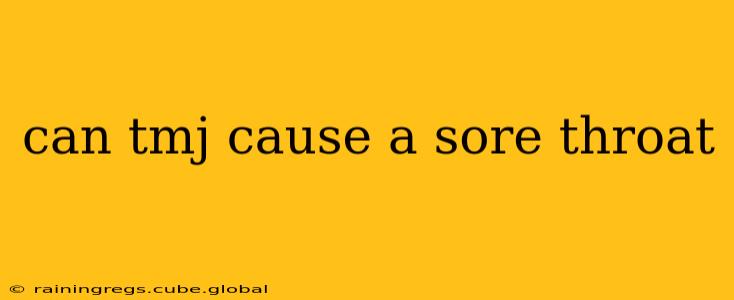Temporomandibular joint (TMJ) disorder, or TMJ, affects the jaw joint and the muscles that control chewing. While jaw pain and clicking are common symptoms, many people wonder if TMJ can also cause a sore throat. The answer is complex and often indirect, but a connection certainly exists for some individuals. This article will explore the potential links between TMJ and sore throats, clarifying the relationship and outlining potential causes.
How Can TMJ Lead to Sore Throat Symptoms?
The connection between TMJ and sore throat isn't a direct cause-and-effect relationship like a virus causing a cold. Instead, the link is often indirect and involves several contributing factors:
-
Muscle Tension and Referral Pain: TMJ disorders frequently involve significant muscle tension in the jaw, neck, and shoulders. This tension can radiate, causing pain in seemingly unrelated areas. The muscles of the throat and pharynx are close to the jaw muscles, making referred pain to the throat a possibility. Think of it like a ripple effect – tension in one area impacting others.
-
Postural Changes: Chronic TMJ issues can alter posture. Poor posture, in turn, can strain the neck and upper back muscles, leading to tension headaches and potentially impacting the throat muscles, contributing to discomfort.
-
Mouth Breathing: Some individuals with TMJ may unconsciously breathe through their mouths due to jaw pain or discomfort. Mouth breathing can lead to dryness in the throat, increasing the chances of irritation and a scratchy, sore feeling.
-
Stress and Tension: TMJ is frequently exacerbated by stress. This stress can also manifest as muscle tension in various parts of the body, including the throat, leading to a sore throat. The psychological impact of chronic pain adds to the overall experience.
-
Bruxism and Myofascial Pain: Bruxism (teeth grinding or clenching) is a common TMJ symptom. This repetitive muscle activity can lead to myofascial pain syndrome, affecting the muscles and fascia throughout the head, neck, and shoulders, including the throat area.
Can TMJ Pain Be Mistaken for a Sore Throat?
Yes, absolutely. The pain referred from the TMJ to the throat region can mimic the symptoms of a classic sore throat. This can make diagnosis challenging, and it's crucial to see a healthcare professional to determine the underlying cause. The pain from TMJ is often more of a dull ache or tightness than the sharp, stabbing pain of a typical sore throat infection.
What Are Other Possible Causes of Sore Throat?
It's essential to remember that many things can cause sore throats, and TMJ is just one possibility. Common causes include:
- Viral or bacterial infections: The most common cause of sore throat is an infection.
- Allergies: Allergic reactions can irritate the throat and cause inflammation.
- Acid reflux: Stomach acid traveling up the esophagus can irritate the throat.
- Dry air: Low humidity can dry out the throat lining, causing discomfort.
When Should You See a Doctor?
If you're experiencing a sore throat along with jaw pain, clicking, or limited jaw movement, it's vital to consult a doctor or dentist specializing in TMJ disorders. They can properly diagnose the cause of your symptoms and recommend appropriate treatment. A sore throat lasting more than a week or accompanied by other symptoms such as fever, difficulty swallowing, or ear pain also warrants a medical evaluation.
How is TMJ Diagnosed and Treated?
Diagnosing TMJ often involves a physical exam, reviewing medical history, and possibly imaging tests like X-rays or MRI scans. Treatment options vary depending on the severity of the condition and can include:
- Physical therapy: To improve jaw mobility and reduce muscle tension.
- Medications: Pain relievers, muscle relaxants, or anti-inflammatory drugs.
- Splints or mouthguards: To protect the jaw joint and prevent teeth grinding.
- Lifestyle changes: Stress management techniques and dietary adjustments.
This information is for general knowledge and does not constitute medical advice. Always consult a healthcare professional for any health concerns or before making any decisions related to your health or treatment.
